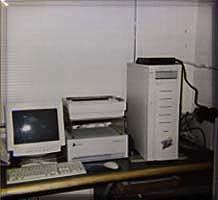

High school student brings Linux and the Internet to his fellow students.
Walt Whitman High School is located in Bethesda, Maryland, a cozy suburb of Washington, D.C. On the surface, Whitman looks like any other school. However, if you look to your right upon entering the building, you will see something rarely seen in our schools: a neat row of terminals, each displaying the message shown in Listing 1. What is unique about this login screen is that the server it comes from is entirely student operated and maintained. The story behind it is as unique as the situation.

In 1994, the students at Walt Whitman High School were told they were on the very bottom of the list to become part of Montgomery County Public Schools' Global Access program. Global Access is an initiative to give all of MCPS state-of-the-art computers and high-speed Internet connections. Having moved into a brand-new building just two years before, Whitman was given low priority for the technology upgrades. However, the community did not stand idly by and allow their school to become a technological backwater. With community support, the school purchased three Power Macintosh computers which are now used for multimedia presentations and a few Windows 95 machines for the WWHS Media Center. These computers were put in a storage room off the Media Center, creating the “Tech Team” where students could use the few available advanced computers for projects and research. However, some students had an even more revolutionary idea: use Linux to provide e-mail accounts and text-based Internet access to everyone in the school.
George Mason University's Center for the New Engineer had a grant to provide several schools in the Washington, D.C. metro area with ISDN links to their four T1 lines. Walt Whitman was chosen as one of the schools. The school already had a donated Compaq Proliant server with the following specifications:
Intel Pentium 100 processor
48MB of RAM
4.2GB of disk space with Compaq's HotPlug system
DigiBoard IMAC ISDN router
Lucent/Livingston PortMaster 2e
Although the machine originally had Novell Netware 4.1 installed, the Tech Team decided to use Linux as the server's operating system. The original system administrator, Gerald Britton, spent hours setting up the server and adding accounts for 1500 students and staff. The server now has over 2000 users and handles a large volume of mail. It is maintained by a team of five students and hosts the school's web site (http://whitman.gmu.edu/) which receives several thousand hits a week. The web site is used for such things as school announcements, contests and even homework postings by teachers.
Five years later, Whitman students still use the server for research projects, to keep in touch with mentors, friends and family, and to communicate with people all over the world. To facilitate easy use of the server, the Tech Team installed a menu system for students and staff to use so they don't have to explore the innards of Linux unless they truly want to. However, many students elect to use a conventional shell and have learned real-world UNIX skills on the server.
Whitman has a one-channel ISDN line to George Mason University which connects their entire school network to the Internet pending the arrival of Global Access. However, the arrival of county support may not be good news for the Tech Team. The county has not given the Tech Team permission to run their server on the Global Access network. Therefore, the Tech Team is currently searching for an Internet service provider to donate bandwidth so they can continue their student-run Internet services. Their system now boasts a Livingston PortMaster 2e and 25 USR modems attached to phone lines throughout the school, with which the Tech Team is experimenting with plans to allow students to dial in and check their e-mail from home at night. Walt Whitman is one of a few public schools using Linux and currently one of two schools in Montgomery County which provides e-mail to all its students. The other school plays host to a Computer Science magnet program that only recently has opened its system to the whole school. MCPS has an e-mail system called FirstClass that students can use. However, students applying for an account must first find a staff sponsor before they can submit their application. Whitman requires only that the student and the student's parents sign a contract promising that the student will not misuse the system. Despite fears that students would use their accounts for non-educational purposes, they understand their access is a privilege and each one of them has a responsibility to safeguard it for the school.
With the Internet becoming more of a research tool than a toy in schools today, it is important that all students have equal access to services like e-mail. Whitman has tried to level the playing field a bit and allow all of its students to have the same opportunity to communicate and share ideas. Whitman's system administrators hope they can find enough resources to continue the service. Whitman's use of Linux is only a small part of the picture. The focus of their efforts isn't just to promote Linux in schools, but to provide the rest of the school with a valuable learning experience that shows the Internet to be a useful tool in the real world.
At the time I originally wrote this article, Whitman's connection was in the process of being severed. The Tech Team submitted proposals to local corporations in the hope that they could receive enough funding to continue the service. Now, Whitman has received a grant from Science Applications International Corporation (http://www.saic.com/) and Bethesda Online Organization (http://www.boo.net/) that will allow it to continue its Internet access for another year.